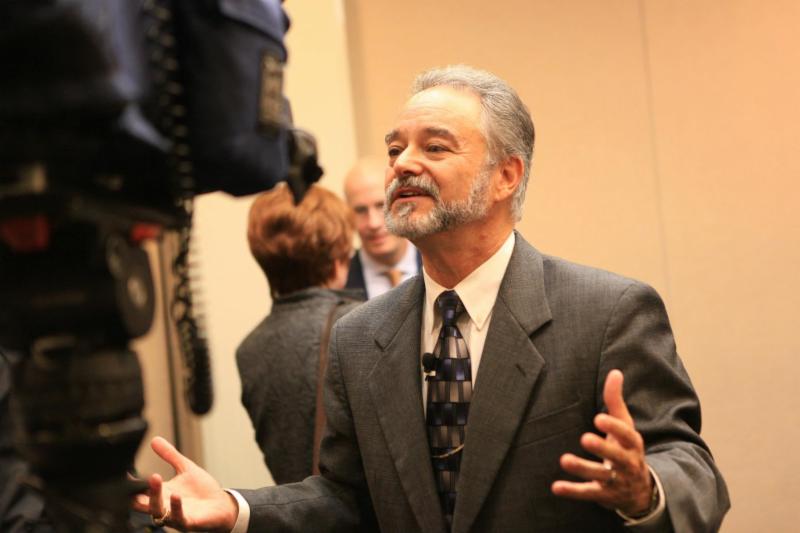 |
 |
 |
 |
 |
 |
 |
 |
 |

With continued malice, the Jewish race has been presented as a mob of violent, vicious, angry, treacherous, bitter mal- contents, who are blamed for the crucifixion.
THE PASSION ERROR
W
ith continued malice, the Jewish race has been presented as a mob of violent, vicious, angry, treacherous, bitter malcontents, who are blamed for the crucifixion. The New Testament provides an interesting contrast about the Jewish people and their alleged hatred of their kinsman, Jesus of Nazareth. There is an especially expressive scene that portrays the triumphant entry of Jesus into Jerusalem. Jesus received a welcome party that might be compared to a modern ticker-tape parade. He was a hero of the people. The news had rapidly spread that Jesus was healing sick folk and casting out demons. Some believed he was their long-awaited Messiah sent to deliver the Jewish people from Rome's oppressive domination. No evidence suggests that these same Jews loved him on Palm Sunday and hated him on Good Friday.
No text within the New Testament offers any hint that His Jewish admirers did a complete and violent turnabout (other than Judas) to demand his arrest or execu- tion. A few accounts reveal that His message was not always received by all hearers. Perhaps that merely shows the honesty of a realistic report. No public speaker pleases everyone, everywhere, every time; not even Jesus. With respect to the inherently critical slant of the Bible, it is correct to consider that the Jewish writers have historically been unashamedly willing to display their own mistakes. Unfortunately, Gentile readers have abused and misused their openness.
Both the Old and the New Testament contain many passages harshly critical of the Jewish people. What was and often still is disregarded is that these strictures were uttered by persons-Jesus being one of them-who were themselves Jews. In all periods, the Jews have been strongly given to self-criticism; perhaps no other peo- ple have so candidly recorded its failings in its official history. But only too often Christians have used these Biblical passages as a stick to beat the Jews with, while
claiming Biblical blessings and promises for themselves as successors to the covenant.
Most readers admit that Jesus was opposed by an angry faction within a segment of Jerusalem's Jewish leadership. That fact must not be expanded into a view that Jesus was hated by all Jews, or all Jewish leaders of the era.
"In many passages of the Gospel of John translators should now know that the appropriate rendering of
Ioudaioi
is not 'Jews,' but 'Judaean leaders'."
It should not be presumed that a consensus existed against Jesus among the broad spectrum of Jews during the time of Jesus. This subject has already been addressed but it is imperative to understand that first century Judaism was not homogenous or uniform. Sectarian groups with diverse practices existed within Israel and the broader scope of world Jewry. These sects ranged from varying theological, political, and sociological views to actually having different beliefs about what was to be included in their sacred writings. In light of the diversity within Judaism, different sects would have responded to Jesus in different ways. Yet, as a result of the stereotyped casting of the Jewish participants in the passion play drama, it is possible that some visitors leave the spectacle convinced that the entire Jewish nation hated and rejected Jesus. This is a misrepresentation at best; and, it is a malicious attempt to promote religious hatred at worst.
The Messiah and Public Opinion
The Gospel of Matthew reports the following about the enthusiastic welcome of Jesus:
A very great multitude spread their clothes on the road; others cut down branches from the trees and spread them on the road. Then the multitudes who went before and those who followed cried out, saying:
"Hosanna to the Son of David! 'Blessed is He who comes in the name of the LORD!' Hosanna in the highest!" And when He had come into Jerusalem, all the city was moved (Matthew 21:8-10).
The entrance of Jesus into Jerusalem was a major event. The New English Bible suggests of the same reference that
"Crowds of people carpeted the road with their cloaks . . . went wild with excitement.
"
J. B. Phillips' version says, "And as he entered Jerusalem a shock ran through the whole city.
"
It is unrealistic to suggest that Jesus suffered an overnight reversal in the opinion of the general public. Rather, the report pictures a hero's welcome for an expected, well-received dignitary. The Jews of the region were inclined to love Jesus and hate the Romans. Jesus fed the multitudes; the Romans taxed them. Rome sent domineering soldiers into Israel. Rome backed heavy-handed local politicians. Rome installed an oppressive style of government. Rome was despised by large segments of the Jewish citizenry. Jesus brought the people a reason to have hope.
Jesus arrived at an opportune time in Israel's history. Messianic expectations were abundant in that land of promise. More than once, false messiahs had raised the hopes of the hopeless. Judaism carried the promise of a Savior.
To many, Jesus appeared to be more effective than prior "messiahs" who preceded him. So, therefore, some of the Jewish followers of Jesus may have been upset that he was not an overnight socio-economic or political savior. Certainly, many Jews, including several of his disciples, misunderstood his reticence to actively and aggressively pursue his perceived "rightful" position as the promised Jewish deliverer. Although many impatient Jewish followers were disap- pointed, no implication suggests that they waited a few days after the Palm Sunday parade and decided to kill Jesus on Good Friday. It did not happen like that. The Jews were simply not prone or empowered to killing criminals.
Rabbi Tarphon, an early opponent of nascent Christianity was one of the most vehement antagonists of the Jewish Christians during the era. Nonetheless, he declared the specific tendency among Jews of his day to disdain execution for any rea- son. He states "that despite his angry disposition he nevertheless said that if he were a member of the Sanhedrin at the time when it had the right to condemn people to death, there would not have been a single death sentence passed."
It is unlikely that Rabbi Tarphon was alone in that sentiment. Jewish people had suffered greatly over many centuries at the hands of many polit- ical oppressors. Therefore, some would have been averse to a call
for execution due only to religious differences. Jews were very accustomed to tolerating varied viewpoints. From that vantage point, the execution of Jesus would not have been tolerated by the mainstream of Jewish people had they been aware of it. Though Jewish law permitted certain punishments, sensible men were normally responsible in the issuing of those most severe judgments. In spite of everything else, crucifixion was only an option for Rome. Neither the Temple police, nor the Sanhedrin had the authority to crucify Jesus. No Jew could make that deci- sion reserved exclusively for Rome.
The Church: God's Avenger for the "Blood Curse"?
Christian anti-Semitism is birthed in misguided religious convictions. It is as if some form of mysterious "common knowledge" existed in the minds of some Christians who implied that Israel had rejected her Messiah and the Church had the duty to right that wrong. The Jewish author of a major portion of Christianity's sacred texts is credited with this reference from Deuteronomy 32:35: "Vengeance is mine; I will repay, saith the Lord" (Romans 12:19). Paul never added any commentary instructing Gentile Christians to act as God's avenger. This religious bigotry is a form of arrogance that presumes that only the Church had the spiritual insight to see what the "blind leaders of the blind" within first century Judaism could not see. More mys- teriously, this view suggests that the Jews of the first century committed an unpardonable sin which destroyed all hope for all Jews of all times.
As a result of biblically nearsighted Christian teaching, Jews in general have been presented as a condemned race. When that Christian argument is based on the commonly held view that the first century Jews rejected Jesus, they patently ignore the fact that the early Christian Church was predominantly a Jewish organization. Therefore, Christian anti-Semites should be cautious when wielding their sword of Holy Writ invoking Matthew 27:25. They are quick to quote the Jewish detractors of Jesus who answered Pilate, saying, "His blood be on us and on our children." Rarely do they acknowledge that neither Mark, Luke, nor John recount such detail as described in that singular Matthean
phrase.
Coincidentally, it is commonly ignored that in the Acts of the Apostles (probably written by the Gentile gospel writer of Luke), the Jewish leadership was particularly sensitive to that exact form of accusation. The Sadducean high priest publicly criticized the apostles in front of the Sanhedrin. It is apparent from the dialogue that they were particularly concerned about the Christians trying to "bring this Man's blood on us!" (Acts 5:28). More important to this investigation is the fact when that verse is quoted within the passion play, it suggests beyond any doubt that a giant angry mob of Jews were demanding the violent death of Jesus, while willingly bringing that horrible "blood curse" on all Jews of all times. With regard to the continual and apparently intentional misrepresentation of the "angry Jewish mob scene," several relevant concerns about the accuracy of that depiction will be considered.
The court area of Pilate could not have contained the enormous crowds often pictured. It is common for passion presentations to create the illusion that all the Jews of Jerusalem were jammed into the area to condemn Jesus. It is also the norm to cast them as an unruly mob on the verge of an uncontrollable riot. Pilate would not have permitted an unruly Jewish mob to demonstrate or react uncontrollably without violent Roman intervention. Without doubt, the Jewish leaders knew that fact better than anyone. They were committed to avoiding a confrontation with Roman authority at that time for fear of reprisals
.
Most significant, it is often overlooked that Pilate had already issued his sentence over Jesus of Nazareth by sunrise. John reports on the time of Pilate's judgment that it was "about the sixth hour" (John 19:14). Robertson's,
A Harmony of the Gospels
says concerning the matter of timing:
It appears that John, who wrote in Asia Minor, long after the destruction of Jerusalem, makes the day begin at midnight, as the Greeks and Romans did. We seem com- pelled so to understand him . . . and in no passage of his Gospel is that view unsuitable. Here then we understand that Pilate passed the sentence about sunrise, which at Passover, near the vernal equinox, would be 6 o'clock.
Therefore, it is highly unlikely that enormous crowds of angry Jews would have gathered at Pilate's before sunrise to hear judi- cial matters.
Most important to any investigation of this type, no group of Jews carried with them the consensus to represent all Jews of first century Judaism. Since Moses, no Jews at anytime have been empowered to represent all Jews of all times.
A serious error exists within the passion play presentation. It is imperative that modern Christian audiences recognize the intentional overemphasis that some passion plays infuse on the "blood curse" portion of the presentation. This particular Scripture may have been abused more by Christian anti-Semites than any other.
In popular anti-Jewish ideology, God's alleged rejection is usually assumed to extend to all present and future generations of Jews. This belief derives mainly from the Gospel report according to which the people themselves invited the responsibility for Jesus' execution by shouting: "His blood be upon us and our children."
The "blood curse" episode rests on a narrow Scriptural foundation . . . Nevertheless, the Passion Play-like countless anti-Jewish screeds through the centuries-makes much of it.
The Oberammergau script of 1960 amplified the perception of universal Jewish guilt by inserting seven dramatically inflammatory references to the "blood curse" on the Jewish people. This "miraculous" multiplication of one phrase into seven suggests that
truth and Christian drama do not always share the same stage
. Jesus was famous for nourishing his audience by multiplying the "loaves and fishes." The passion play has fed its audience poison by multiplying hatred and condemnation.
~ Are you yet captivated by the truth buried in the religious traditions of hated? Get your on copy of Politics of Hate Crimes of Passion today.

|
In 1973, I had a hopeless marriage, a deadly drug problem, and a life without purpose. As a result of the suffering and passion of the man depicted in the film, His love healed my marriage, redeemed me from drugs,
and revealed a purpose for my life that is both compelling and renewing. If you lack hope, if you lack peace, or if you lack purpose, please embrace God's love. 
Trust and obey the man called Jesus the Messiah. Contrary to what you might think, He declared Himself to be God and He was wor
shipped by His early Jewish followers. I declare my allegiance and remind you of His words, "I am the way, the truth, and the life. No one comes to the Father except through Me" (John 14:6). I realize this implies a very exclusive membership. However, all are welcome and the price has been paid by the One Who gave the invitation. Jesus said, "Come to Me, all you who labor and are heavy laden, and I will give you rest" (Matthew 11:28). I know this is true because I came and I found rest. I remain eternally grateful and eternally His.
Read More...
|
I am reaching out to you to ask for just 10 minutes of your time. I am currently working on some doctoral research on the different ways that Christian's engage the Bible.
Will you go to
www.engagethebible.us and take a brief survey. Your participation will help the academic world and help provide quality research to the greater Christian community.
Thank you so much
Joshua Weiss
Abundant Life Assembly of God
|
 |
HELP Our Missionaries
Will you help us sponsor 20 different native missionaries in various parts of the world?
|
|
|
|
|
|
 |
|
|
|
 |
|
 |
|
 |
 |
 |
 |
 |
 |
 |
 |
 |